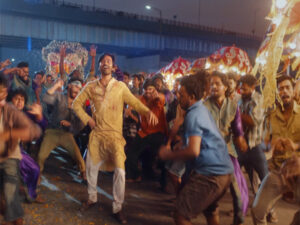More than class, caste divide makes things complicated in India:’Class’ showrunner Ashim Ahluwalia
Mumbai, Feb 22 (PTI) “Class” showrunner Ashim Ahluwalia says the Netflix show, an adaptation of popular Spanish series “Elite”, gave him a chance to explore the rich and poor divide through the lens of class and caste.
The eight-episode show, which premiered on February 3, is set in a fancy Delhi school and opens with a murder before taking viewers to the lives of the rich students and the three slum children who have joined the school.
The series has been directed by Kabir Mehta and Gul Dharmani.
Ahluwalia said he wanted to make a feature film about teenagers for some time so when he got the offer to adapt the series, he realised that it would translate well in Indian setting.
“The conflict between the rich and poor kids felt very relevant to our country. I also wanted to show another side of India which many people may have heard about but never seen or experienced,” the filmmaker told PTI in an interview.
“Here (in India) other than class there is also caste that makes things more complicated. Also, the role of parents and families in their children’s lives is very different from Europe, so I wanted the parents to play a much bigger role,” he added.
The filmmaker, known for his films “Miss Lovely” and “Daddy”, said he was keen to highlight the caste divide and social media humiliation both entrenched in India — through the series.
“The way younger people in urban India live through social media was also important to me as the original show didn’t have too much of that humiliation online became a key subject,” The National award-winner said.
Ahluwalia said he consciously chose to dig deeper into the lives of people from the lower rungs of society, unlike the original series, “Elite”, which is set amongst the wealthy.
“I decided to change the name (also) from Elite’ to Class’ as I wanted to make something that was less about elite society and more about the way different classes interact. That was more interesting to me.”
Claiming that “Class” is one-of-its-kind young adult series being made in India, Ahluwalia felt it is important to bring to fore the problems faced by the youth.
“I’m hoping it becomes a benchmark in terms of real conversations that we need to have about what young people experience.
“Our society, like any other, is going through a lot of turmoil and it’s good to engage with real life sometimes rather than pretend nothing is happening. I didn’t want to make something easy that could be easily forgotten,” he added.
“Class” features an ensemble cast including Gurfateh Pirzada, Anjali Sivaraman, Ayesha Kanga, Chayan Chopra, Chintan Rachchh, Cwaayal Singh, Madhyama Segal, Moses Koul, Naina Bhan, Piyush Khati and Zeyn Shaw.
The Indian show had raised some eyebrows for its intimate scenes but Ahluwalia shared their team worked with an intimacy coordinator, whose primary job was to ensure that actors felt comfortable.
“We worked closely with Aastha (Khanna), our intimacy coordinator, she was present on set to make everyone feel secure but also was a great help, to prepare actors for what to expect even before going into production,” the “Miss Lovely” director added.
Ahluwalia cited the example of his first movie “Miss Lovely”, which was about two brothers who produce B-grade horror films in the mid-1980s, and added that normalized adult themes.
“Nobody had ever dealt with that kind of stuff back then, so I’m not really new to these themes. The more we normalize adult themes, the more adult we can be as a society.
“So, for me, the less this stuff is buried under the carpet, the more conversation, the better. But you have to be understanding and not voyeuristic or exploitative.”
The director’s upcoming film projects include an international feature and a cinematic adaptation of a Danish murder novel.
“There is an international film, and one is based in Mumbai, a kind of wild thriller with two female stars. It is based on a Danish crime novel,” Ahluwalia informed.
Asked if he is hesitant to be working on a mainstream Hindi film, he said, “Probably, unless I really connect with it somehow. I just need to be able to make something I believe in for it to be any good.”






